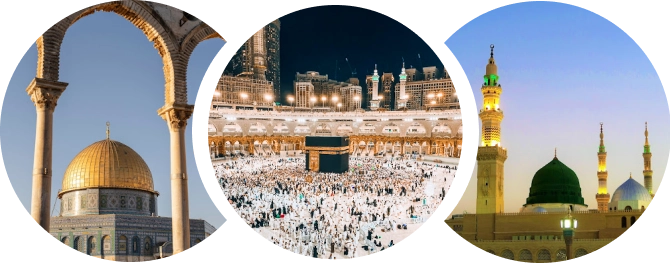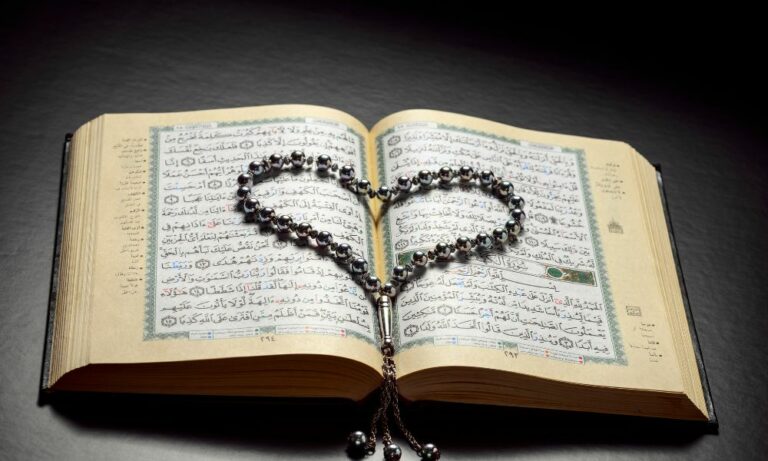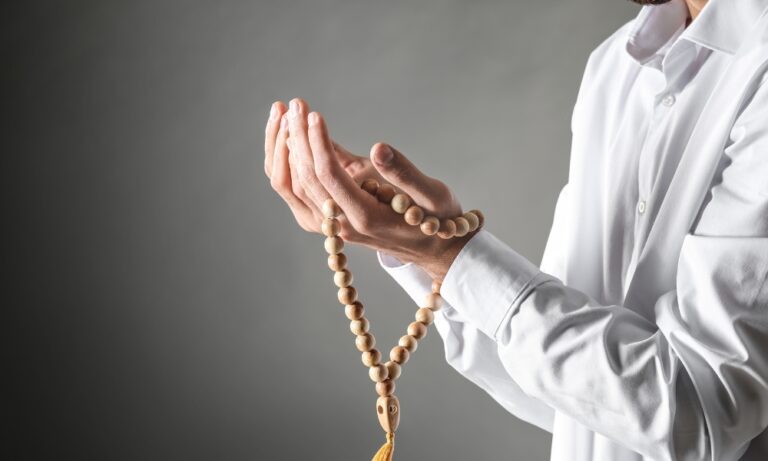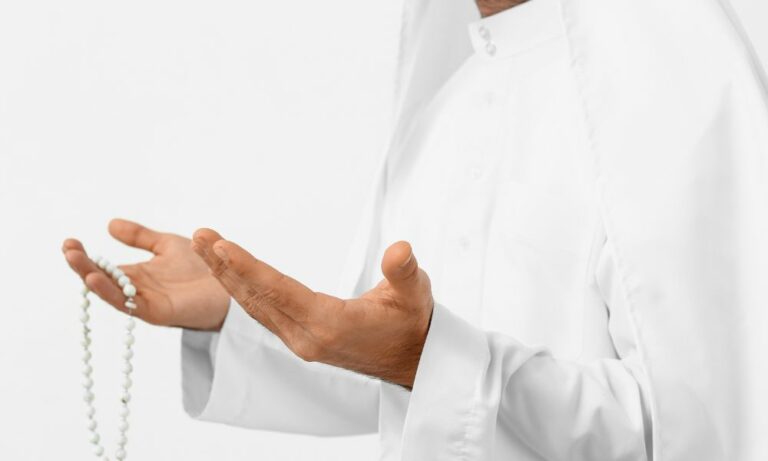Powerful Duas For Forgiveness From Allah SWT
Are you struggling with guilt over past deeds and seeking forgiveness from Allah SWT? In Islam, the belief is firm that no sin is beyond Allah SWT’s mercy. This blog post offers a collection of potent Duas sourced from the Quran and Hadith, designed to help you ask for divine pardon sincerely.
Keep reading to find solace in these powerful words and start your journey towards redemption.
Understanding Sins in Islam


In Islam, sins are categorized into major and minor sins, with the concept of repentance playing a crucial role in seeking forgiveness from Allah SWT.
Major sins vs. minor sins
In Islam, sins are divided into two primary categories: Major and minor. This differentiation is crucial as it influences how one seeks forgiveness and its impact on spiritual growth.
| Major Sins | Minor Sins |
| In the Islamic faith, major sins are serious transgressions. Shirk (associating partners with Allah SWT), murder, adultery, and disrespecting parents are examples of such acts. | Minor sins, on the other hand, are less grave, but they can lead to major sins if done consistently. Minor sins include incorrect prayer, immodest behavior, and cursing. |
| The steps to forgiveness from these sins are lengthy. Only performing good deeds doesn’t erase these sins. Repentance from major sins consists of four stages: remorse, repentance, resolve, and repair. | According to the Qur’an, minor sins can be erased through good deeds. Almost any good deed and act of worship can be used to seek forgiveness for these sins. |
| Major sins necessitate direct repentance to Allah SWT to be forgiven. | Minor sins can be atoned for through consistent prayer, charity, and other acts of virtue. |
Understanding the distinction between major and minor sins is essential in seeking forgiveness and personal growth in the Islamic faith.
The concept of repentance (Tauba)


Repentance, or Tauba in Islam, is the process of turning away from sin and sincerely not repeating it. It’s more than feeling regret; it’s about a total change of heart and mind.
Prophet Muhammad PBUH stressed that when a person repents sincerely, Allah SWT forgives them completely as if they’ve never sinned. That’s why repentance holds such high importance in Islamic spirituality.
- الْتَّائِبُ مِنَ الذَّنْبِ کَمَنْ لَا ذَنْبَ لَهُ
One who repents from sin is like someone without sin. Hadith 28, 40 Hadith Shah Waliullah
Allah SWT embodies two significant titles in this divine interaction – Al-Ghafir (The Forgiver) and Al-Ghafur (The All-Forgiving). The believer who seeks forgiveness can find comfort knowing that their plea does not fall into space but into the merciful ears of Allah SWT. Prophet Muhammad PBUH said:
- “ قَالَ اللَّهُ عَزَّ وَجَلَّ رَحْمَتِي سَبَقَت غَضَبِي ”
Allah, the Exalted and Glorious, said: My mercy excels My wrath. Sahih Muslim 2751b
Believers acknowledge their shortcomings before Allah SWT and ask for His forgiveness through Duas like “Rabbanaa faghfir lana thunoobana” or “Rabbana thalamnaa anfusanaa.”
They also commit themselves not to persist on the wrong path deliberately.
- For most accurate Athan and Prayer times, please click here
Powerful Duas for Forgiveness


This section will provide powerful Duas for seeking forgiveness from Allah SWT, including specific prayers from the Quran and Hadith, as well as supplications for major sins, repetitive sins, and sins done in private.
Duas from the Quran
The Quran provides powerful Duas for seeking forgiveness from Allah SWT.
- رَبَّنَا فَٱغْفِرْ لَنَا ذُنُوبَنَا وَكَفِّرْ عَنَّا سَيِّـَٔاتِنَا وَتَوَفَّنَا مَعَ ٱلْأَبْرَارِ
rabbanā faghfir lanā dhunūbanā wa kaffir ʿannā sayyiātinā wa tawa fanā maʿa l-abrār
Our Lord! Forgive our sins, absolve us of our misdeeds, and join us with the virtuous when we die. 3:193
- رَبَّنَا ٱغْفِرْ لَنَا وَلِإِخْوَٰنِنَا ٱلَّذِينَ سَبَقُونَا بِٱلْإِيمَـٰنِ وَلَا تَجْعَلْ فِى قُلُوبِنَا غِلًّۭا لِّلَّذِينَ ءَامَنُوا۟ رَبَّنَآ إِنَّكَ رَءُوفٌۭ رَّحِيمٌ
rabbanā ghfir lanā wa līkhwāninā lladhīna sabaqūnā bi l-īmāni wa lā tajʿal fi qulūbinā ghillal llilladhīna āmanū rabbanā innaka ra’ūfun raḥīmun
“Our Lord! Forgive us and our fellow believers who preceded us in faith, and do not allow bitterness into our hearts towards those who believe. Our Lord! Indeed, You are Ever Gracious, Most Merciful.” 59:10
- رَبَّنَا ٱغْفِرْ لَنَا ذُنُوبَنَا وَإِسْرَافَنَا فِىٓ أَمْرِنَا وَثَبِّتْ أَقْدَامَنَا وَٱنصُرْنَا عَلَى ٱلْقَوْمِ ٱلْكَـٰفِرِينَ
rabbanā ghfir lanā dhunūbanā wa isrāfanā fi amrinā wa thabbit aqdāmanā wa nṣurnā ʿala qawmi l-kāfirīna
And all they said was, “Our Lord! Forgive our sins and excesses, make our steps firm, and grant us victory over the disbelieving people.” 3:147
Duas from the Hadith
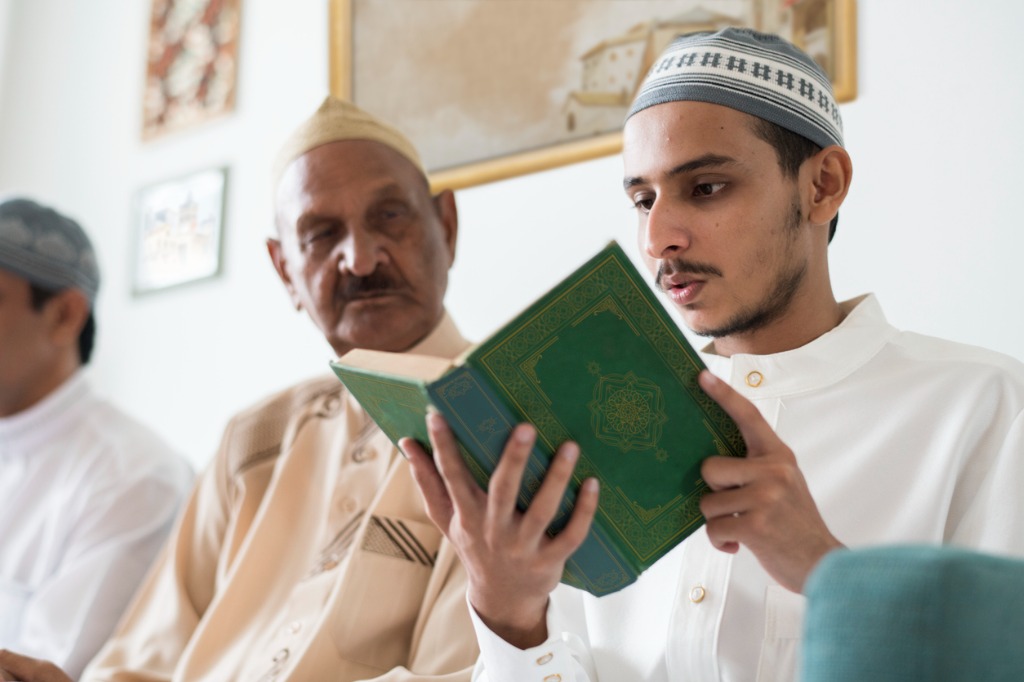

The Hadith provides a treasure trove of supplications that can be used to ask for God’s forgiveness. Here are some powerful Duas from the Hadith.
The best Dua for seeking forgiveness (Sayyidul Istighfar)
- اللهم أنت ربي، لا إله إلا أنت ، خلقتني وأنا عبدك، وأنا على عهدك ووعدك ما استطعت أعوذ بك من شر ما صنعت أبوء لك بنعمتك علي، وأبوء بذنبي، فاغفر لي فإنه لا يغفر الذنوب إلا أنت
‘Allahumma Anta Rabbi, la ilaha illa Anta, khalaqtani wa ana ‘abduka, wa ana ‘ala ‘ahdika wa wa’dika mastata’tu, a’udhu bika min sharri ma sana’tu, abu’u laka bini’matika ‘alayya, wa abu’u bidhanbi faghfir li, fa innahu la yaghfirudh-dhunuba illa Anta.
O Allah! You are my Rubb. There is no true god except You. You have created me, and I am Your slave, and I hold to Your Covenant as far as I can. I seek refuge in You from the evil of what I have done. I acknowledge the favors You have bestowed upon me and confess my sins. Pardon me, for none but You has the power to pardon. Riyad as-Salihin 1875
Prophet Muhammad PBUH called this supplication as “the best supplication for seeking forgiveness.”
Prophet Muhammad PBUH used to recite this Dua before his death
Aisha R.A narrated that Prophet Muhammad PBUH used to supplicate this Dua frequently before his death:
- “سبحان الله وبحمده، أستغفر الله، وأتوب إليه”
Subhan Allahi wa bihamdihi; Astaghfirullaha wa atubu ilaihi
Allah is free from imperfection, and I begin with praising Him. I beg forgiveness from Allah, and I turn to Him in repentance.” Riyad as-Salihin 1877
- Download Muslim Sadiq app, and enjoy all top-notch features for everyday activities!
Seeking forgiveness by reciting this Dua after prayer


Thauban R.A describes a supplication that Prophet Muhammad PBUH used to recite after prayer:
Whenever the Messenger of Allah (ﷺ) finished his Salat (prayer), he would beg forgiveness three times [by saying, ‘Astaghfirullah’ (3 times)] and then he would say:
“Allahumma Antas-Salamu, wa minkas-Salamu, tabarakta ya Dhal-Jalali wal-Ikram.”
(O Allah! You are the Bestower of security, and security comes from You; Blessed are You. O Possessor of glory and honor.” Riyad as-Salihin 1876
Recite this Dua during your prostration in prayer
Abu Hurairah R.A narrated:
The Messenger of Allah (ﷺ) used to say in his prostration:
- “اللهم اغفر لي ذنبي كله دقه وجله، وأوله وآخره، وعلانيته وسره”
Allahum-maghfir li dhanbi kullahu: diqqahu wa jillahu, wa ‘awwalahu wa akhirahu, wa alaniyatahu wa sirrahu
(O Allah! Forgive all my sins, the small and the great, first and the last, the open and the secret).” Riyad as-Salihin 1429
- Read Al Quran along with interpretation in the easiest way possible by clicking here
The Importance of Seeking Forgiveness


Seeking forgiveness is of utmost importance in Islam as it has spiritual implications and allows for personal growth and development.
Spiritual implications
Seeking forgiveness purifies the soul, brings one closer to Allah SWT, and promotes internal growth. Individuals who follow this path of mercy strengthen their connection with their Creator, recognizing His boundless compassion, as mentioned in the Quran verses.
Personal growth
Seeking forgiveness in Islam promotes personal development by fostering a sense of humility and direction in the believer. The Prophet Muhammad PBUH mentioned that genuine repentance can wash away our sins, allowing us to move forward without the burden of our mistakes in the past.
When we sin, we feel burdened, but when we seek forgiveness, we feel better. At the same time, Allah SWT builds our desire to do more good deeds, fostering self-improvement.
Indeed, both Quran verses and Hadiths stress the importance of seeking Allah SWT’s mercy to develop personally. Instead of being bound by guilt or regret, we liberate ourselves through forgiveness and cultivate an inner strength that prepares us to face future challenges with wisdom and resilience.
As a result, Dua for forgiveness becomes more than just a request for divine forgiveness; it also serves as a tool for developing our character and spirituality.
- Islamic holidays and important dates are listed here
Conclusion
Seeking Allah SWT’s forgiveness through powerful Duas is essential to Islamic teachings. These supplications, derived from the Quran and Hadith, allow us to repent for our sins and seek forgiveness from our Creator.
We can strengthen our faith, develop spiritually, and experience Allah SWT’s profound mercy and forgiveness by reciting these Duas regularly with sincerity and genuine remorse.
May Allah SWT bestow upon us all the ability to seek His forgiveness and eternal mercy.
FAQs
What are some powerful short duas for forgiveness from Allah SWT?
Some powerful short duas for forgiveness include
- “Rabbanaa faghfir lana thunoobana”
- “Astaghfir Allah wa atoobu ilayh” (I seek forgiveness from Allah and repent towards Him.)
- “Allhumma innaka afuwwun tuhibbul afwa fa’fu anni.” (O Allah, You are Most Forgiving, and You love forgiveness; so forgive me.)
These supplications can be made during prayer times.
How can we seek repentance and forgiveness in Islam?
In Islam, you can seek repentance by admitting your sins, feeling genuine remorse, sincerely intending not to sin again, and requesting Allah SWT’s mercy through Duas such as Sayyidul Istighfar.
Can practicing righteous deeds earn us forgiveness for major sins in Islam?
Giving charity, reading the Quran, and praying tahajjud or Zikr all please Allah SWT, but they do not always result in instant forgiveness from major sins like shirk, murder, or adultery. It necessitates genuine Tauba (repentance) and a pure heart in seeking Allah SWT’s mercy.
Is there any mention of Dua for forgiveness in Islamic religious texts?
Yes! Many Duas were taught by Prophet Muhammad (PBUH), which Muslims can find in Hadith collections such as Sahih Bukhari and Riyad al Saliheen; some are mentioned in this article.
أدعية قوية للمغفرة من الله سبحانه وتعالى
هل تعاني من الذنب بسبب أفعالك الماضية وتطلب المغفرة من الله سبحانه وتعالى؟ في الإسلام، الاعتقاد الراسخ بأنه لا ذنب خارج عن رحمة الله سبحانه وتعالى. تقدم هذه المدونة مجموعة من الأدعية القوية المستمدة من القرآن والحديث، والمصممة لمساعدتك على طلب العفو الإلهي بإخلاص. استمر في القراءة لتجد العزاء في هذه الكلمات القوية وتبدأ رحلتك نحو الخلاص.فهم الذنوب في الإسلام


الكبائر مقابل الذنوب الصغيرة
تنقسم الخطايا في الإسلام إلى قسمين رئيسيين: الكبرى والصغرى. يعد هذا التمييز أمرًا بالغ الأهمية لأنه يؤثر على كيفية سعي الفرد إلى المغفرة وتأثيره على النمو الروحي. <عرض الجدول = "623"> <الجسم> <تر>مفهوم التوبة (التوبة)


- الْتَّائِبُ مِنَ الذَّنْبِ كَمَنْ لا ذَنْبَ لَهُ
- " قَالَ اللَّهُ عَزَّ وَجَلَّ رَحْمَتِي سَبَقَت غَضَبِي "
- للحصول على أدق أوقات الأذان والصلاة، يرجى النقر هنا
أدعية قوية للاستغفار


أدعية من القرآن
يوفر القرآن أدعية قوية لطلب المغفرة من الله سبحانه وتعالى.- رَبَّنَا فَٱغْفِرْ لَنَا ذُنُوبَنَا وَكَفِّرْ عَنَّا سَيِّـَٔاتِنَا وَتَوَفُا مَعَ الْأَبْرَارِ
- رَبَّنَا اغْفِرْ لَنَا وَلِإِخْوَانِنَا الَّذِينَ سَبَقُونَا بِالْإِيمَانِ وَلَا تَجْعَلْ فِى قُلُوبِنَا غِلًّيَّا لِلَّذِينَ رَحِيمٌ
- رَبَّنَا ٱغْفِرْ لَنَا ذُنُوبَنَا وَإِسْرَافَنَا فِىٓ أمْرِنَا وَثَبِّتْ أَقْدَامَنَا وَٱنصُرْنا عَلَى الْقَوْمِ الْكَـٰفِرِينَ
أدعية من الأحاديث


أفضل دعاء الاستغفار (سيد الاستغفار)
- اللهم أنت ربي، لا إله إلا أنت، خلقتني وأنا عبدك، وأنا على عهدك ووعدك ما اشتريت أعوذ بك من شر ما صنعت أبوء لك بنعمتك علي، وأبوء بذنبي، فاغفر لي لا يغفر الذنوب إلا
كان النبي محمد صلى الله عليه وسلم يقرأ هذا الدعاء قبل وفاته
عن عائشة رضي الله عنها أن النبي محمد صلى الله عليه وسلم كان يكثر من الدعاء بهذا الدعاء قبل وفاته:- "سبحان الله وبحمده، أستغفر الله، وأتوب إليه"
- قم بتنزيل تطبيق مسلم صادق، واستمتع بجميع الميزات المتميزة للأنشطة اليومية!
الاستغفار بهذا الدعاء بعد الصلاة


اقرأ هذا الدعاء أثناء سجودك في الصلاة
روى أبو هريرة رضي الله عنه: كان رسول الله صلى الله عليه وسلم يقول في سجوده:- "اللهم اغفر لي ذنبي كله دقه وجله، وأوله وأخيره، ولانيت وسره"
- اقرأ القرآن مع التفسير بأسهل طريقة ممكنة بالضغط هنا
أهمية طلب المغفرة


الآثار الروحية
الاستغفار يطهر النفس، ويقرب الإنسان من الله سبحانه وتعالى، ويعزز النمو الداخلي. والأفراد الذين يتبعون طريق الرحمة هذا يقويون ارتباطهم بخالقهم، ويدركون رحمته اللامحدودة، كما جاء في الآيات القرآنية.النمو الشخصي
إن طلب المغفرة في الإسلام يعزز التنمية الشخصية من خلال تعزيز الشعور بالتواضع والتوجيه لدى المؤمن. ذكر النبي محمد صلى الله عليه وسلم أن التوبة الصادقة يمكن أن تغسل ذنوبنا، وتسمح لنا بالمضي قدمًا دون تحمل عبء أخطائنا في الماضي. عندما نخطئ نشعر بالثقل، ولكن عندما نطلب المغفرة نشعر بالتحسن. وفي الوقت نفسه، يبني الله سبحانه وتعالى رغبتنا في القيام بالمزيد من الأعمال الصالحة، وتعزيز تحسين الذات. وفي الواقع، تؤكد الآيات والأحاديث القرآنية على أهمية طلب رحمة الله سبحانه وتعالى لتطوير الشخصية. فبدلاً من أن نكون مقيدين بالذنب أو الندم، نحرر أنفسنا من خلال التسامح وننمي القوة الداخلية التي تؤهلنا لمواجهة التحديات المستقبلية بحكمة ومرونة. ونتيجة لذلك، يصبح الدعاء للمغفرة أكثر من مجرد طلب للمغفرة الإلهية؛ كما أنه بمثابة أداة لتطوير شخصيتنا وروحانيتنا.- الأعياد الإسلامية والتواريخ المهمة مدرجة هنا
الاستنتاج
إن طلب مغفرة الله سبحانه وتعالى من خلال الأدعية القوية أمر ضروري للتعاليم الإسلامية. هذه الأدعية المستمدة من القرآن والحديث تسمح لنا بالتوبة عن ذنوبنا وطلب المغفرة من خالقنا. يمكننا تقوية إيماننا، والتطور الروحي، واختبار رحمة الله سبحانه وتعالى وغفرانه العميق من خلال تلاوة هذه الأدعية بانتظام بإخلاص وندم حقيقي. نسأل الله سبحانه وتعالى أن يمنحنا جميعا القدرة على طلب مغفرته ورحمته الأبدية.الأسئلة الشائعة
ما هي بعض الأدعية القصيرة القوية للاستغفار من الله سبحانه وتعالى؟
بعض الأدعية القصيرة القوية للاستغفار تشمل- "ربنا فغفير لانا ثنوبانا"
- "أستغفر الله وأتوب إليه"
- "اللهم إنك أفوون تهببول أفوا فافو آني." (اللهم إنك عفو تحب العفو فاعف عني).

